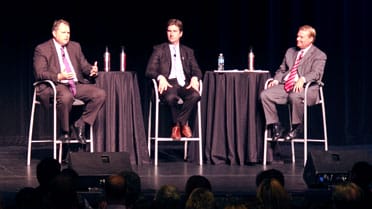ASU adds composting program, joins EPA Food Recovery Challenge
To celebrate America Recycles Day, ASU now has composting bins at the Hassayampa and Barrett, The Honors College dining halls that compost all food and paper food-service items.
ASU groups seek to collaborate, construct interdisciplinary energy narrative
The Energy, Ethics, Society, and Policy research community meets to combine stories that capture the realities of clean energy and show how energy interacts with us on a daily basis.
Embracing diversity and fostering access to science for all
In an ASU News op-ed piece, Sustainability Scientist Tirupalavanam Ganesh asserts that women are needed in the hard sciences to enhance research enterprises and share creative perspectives.
Wastewater recovery research earns NASA grant
Sustainability Scientist Mary Laura Lind is set to use the $200,000 grant to develop anti-corrosion polymer membranes fortified against highly acidic solutions and salts to be used for water filtration.
ASU appoints Halden as director of new Center for Environmental Security
Sustainability Scientist Rolf Halden says the Center will use a proactive approach to examine chemical and biological threats in the environment locally and globally and develop mitigation strategies.

Valley mayors discuss sustainability in the midst of urban growth
Arizona's desert cities face many unique challenges associated with planning and achieving sustainability, particularly in urban areas. The downturn in the economy coupled with environmental changes and shifts in population
Gasoline distribution is problematic in the wake of Hurricane Sandy
Distinguished Sustainability Scholar John Hofmeister explains to CBS This Morning that gasoline cannot be distributed through depots or station pumps due to electricity outages.
Should we be building down instead of up?
Samuel Ariaratnam talks about the possible advantages of developing our underground real estate and what it could mean for public safety, land use, and environmental sustainability.
Arizona Solar Summit III: Game-changing efforts to propel Arizona’s leadership in a growing solar industry
The Arizona Solar Summit III took place October 9-10, 2012 at ASU SkySong hosted in partnership with ASU LightWorks. The summit’s participants included a collective group of distinguished panelists all
ASU team showcases hydrogen-powered vehicle in Chem-E-Car championship
A team of engineering students advised by Sustainability Scientist César Torres takes eighth place with their hydrogen fuel cell-powered vehicle that uses a chemical reaction to stop the car.
Clean energy prevails at biodesign professor’s home
ASU faculty member Phillip Stafford challenges his colleagues to implement clean energy at home. Stafford shares how he’s achieved a $12 annual electricity bill for his 5,000-square-foot, Phoenix home. To
Student team moves on to another Global Sustainability Challenge
Widely-publicized team FlashFlood is now competing in the Yum! Global Sustainability Challenge to win funds for their phone app that coordinates leftover food collection and distribution to people in need.